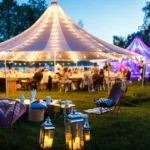Catering for a Birthday Party: DIY vs. Professional Catering
Event Planner Checklist: Key Steps to Planning a Perfect Event
An event may be a small family function with a restricted number of invitees or a large-scale business conference, but it can only be done with perfect planning. It involves many things, like the selection of a suitable venue, the sequence of various important segments of the event, the selection of the menu, and more.
The success of an event is mainly dependent on proper planning. You may hire an excellent venue for your function, but conducting it perfectly will require a lot of planning beforehand. People often need clarification about where to start. Things may start piling up when you try to figure out how to move forward. At times, it may get out of your control and result in a flopped event. Hence, it is essential to handle the task in a properly planned way. Here comes the art of event management and planning.
Event Planning Checklist
To start planning any event you need to make a checklist so you don’t miss out on any important detail or task. Keep reading this article to understand how an event planning checklist may help you manage a perfect event.
Start Early with Planning an Event
Based on the nature and scale of the event, you will need to start planning it well before the scheduled date and time. In any case, one has to initiate the process at least 2-3 months before the expected date, while the exact date, time, and venue may be sorted out later.
Starting with an early event planner is helpful in multiple ways:
- You get sufficient time to search for the best available venue.
- You have the time to negotiate to get the best deal regarding the venue’s cost.
- You have ample time to select the most exciting menu at the lowest price.
- You can finalize the list of invitees so that any critical person may be noticed.
- You can finalize the date and time of the event, considering all the possibilities.
Nature and Type of the Event
The first and foremost important thing is to have clarity about the nature and type of the upcoming event. The sequence and process of the planning checklist will be based on this. Preparing for a conference is quite different from preparing for a wedding or birthday party.

Date and Time of the Event
Next on the event planner checklist is the date and time of the event. This is a difficult task, as you have to consider so many things. It may involve the availability of the key participants. It would be best if you also considered the availability of most of the invitees. If it is a business event, you may have to get the consent of the chief guest at his convenience.
But the most critical part of this process is to look for the best date, day, and time for the event when the venue cost is the lowest. The rates are often flexible for different days of the week and months of the year. The event planner has to keep in mind all these important aspects when selecting the appropriate time and date of the event.
Selection of Venue
Once you are clear about the type of event and have decided the possible date and time for it, the next checklist point is to select the venue. There will be hundreds of possible options, but most of them might be irrelevant. You have to choose the best available option based on your needs.
The most important is the size and capacity of the venue. An oversized venue is a good use of money, while an undersized venue will spoil the whole event. So, to be on the safe side, you may hire a space sufficient to accommodate 300 people if you are expecting 250 to 260 participants. It would help if you always kept a cushion for unexpectedly higher participation.
Another important consideration is the cost. You may want to search for a venue that offers the best price, but you must also recognize the availability of various facilities.

The Budget
An event involves a set of expenses, such as the cost of the venue, food and drink, furniture, lighting, sound system, decoration, and so on. You cannot let it go unchecked. Keeping in view all the aspects, you will need to decide what your preferred budget is. It is also important to allocate a specific budget for every part of the event. Once you know the budget, you must find appropriate vendors to supply different items. This might be a time-consuming affair, involving a bit of extra effort.
The Theme and Decoration
Theme and decoration are crucial parts of the event. The optics are always very important. So, it is essential to decide on the appropriate theme for the party and then decorate your space accordingly. Many ideas are available on our website; you may select the one that suits you best. And remember proper lighting. It plays a vital role in a successful event.
The Invitees
Make a list of invitees. Double-check the list to ensure all the relevant persons are included, and no one is missing. If the number exceeds your estimate, you can either remove a few less critical invitees, or you may like to increase the seating arrangements.
The Invitations
Once the list is finalized, the next step is to send invitations to the invitees. The traditional invitation cards may not be relevant these days. You may like to use various social media platforms to invite your guests. But remember to follow a set pattern of invitations that will be sent to every participant. A proper invitation message can be drawn in an attractive format, giving the required information such as the complete address of the venue, date, day, and time of the event. If relevant, you may also add the dress code for the function.
Most importantly, make sure that all the invitees on your list are sent the invitation. You can also require acknowledgment from them to ensure that everyone has received it.
The Menu
Apart from other activities on the day of the function, the most important one is the food and drinks. Selecting a popular menu might be helpful, but you may also like to customize it according to your choice and preference. They will remember the food you serve to the participants for days to come. Hence, it is the most crucial and exciting part of your event. Selecting the best menu is one thing but serving it in a style is another level.
The Event Schedule
Generally, a party or function ideally starts with the arrival of guests and ends at their departure. But the sequence of activities in between will be what needs to be scheduled beforehand. The best time to do so is around 2-3 weeks before the event day. List down how you would like your party to progress. Allocate a time slot for each activity. The food is usually served as the last activity. Playing background music is also a popular and essential part of such functions.
But the sequence will be different for a conference or business event. Here, you will have to follow a set pattern, according to the schedule, such as the speech of the experts and the chief guest, followed by a question-and-answer session. And at the end, serving the food and drinks.
That means how your party or function needs to progress depends on the nature of the event.
Recheck the Checklist
Most of the tasks should be completed well before the scheduled day of the event. Everything needs to be in place before the event starts. You may recheck the checklist one day before the event to ensure this. Ideally, all arrangements should have been made according to the checklist. If something is left unattended, you will still have a day to accomplish the leftover task.
This is quite an essential part of the entire preparations. So, take it.
To Sum Up
Preparations for conducting an event or party are vital to its successful accomplishment. Whether it is a family function, a wedding ceremony, a birthday party, or a business event or conference, you cannot ignore even a minute part of it. Perfect planning needs to be in place well before time so that the event progresses as expected.
Starting with the selection of date and time, there are many things to be taken care of well before the actual day of the event. So, the best way to keep track of every preparation is to make a checklist and follow it until everything is completed at least a week before the event day. A last recheck can also be performed a day before the event.
Related Posts
No related posts found.




